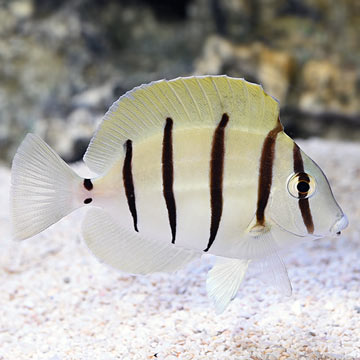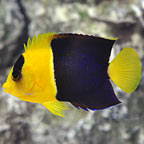
Additional locales and sizes may be available!
Additional locales and sizes may be available! Email me when availableQuick Stats
What do these Quick Stats mean? Click here for more information
What do these Quick Stats mean? Click here for more information
Overview
It requires a large area in which to swim - at least a 125 gallon aquarium. It should not be included in a tank with other species of Tangs, since they will harass it. It will live peacefully with other Convict Tangs if all are introduced to the tank at the same time.
Convict Tangs have no distinguishing characteristics which will help differentiate males from females. They are very difficult to breed in the aquarium setting because the fry remain in the planktonic stage for months, and are in constant danger from filters.
Although Tangs will eat meaty foods along with the other fish in the aquarium, it is important that they are offered plenty of marine based seaweed and algae. This will strengthen their immune system, reduce aggression and improve their overall health. Offer dried seaweed tied to a rock or use a veggie clip, and feed at least 3 times per week. Sea Veggies, Seaweed Salad and Ocean Nutrition are all ideal products and are very easy to use.
Approximate Purchase Size: Tiny: 3/4" to 1-1/2"; Small: 1-1/2" to 2"; Small/Medium: 2" to 2-3/4"; Medium: 2-3/4" to 3-1/4"; Medium/Large: 3-1/4" to 4-1/4"; Large: 4-1/4" to 6-1/4"






